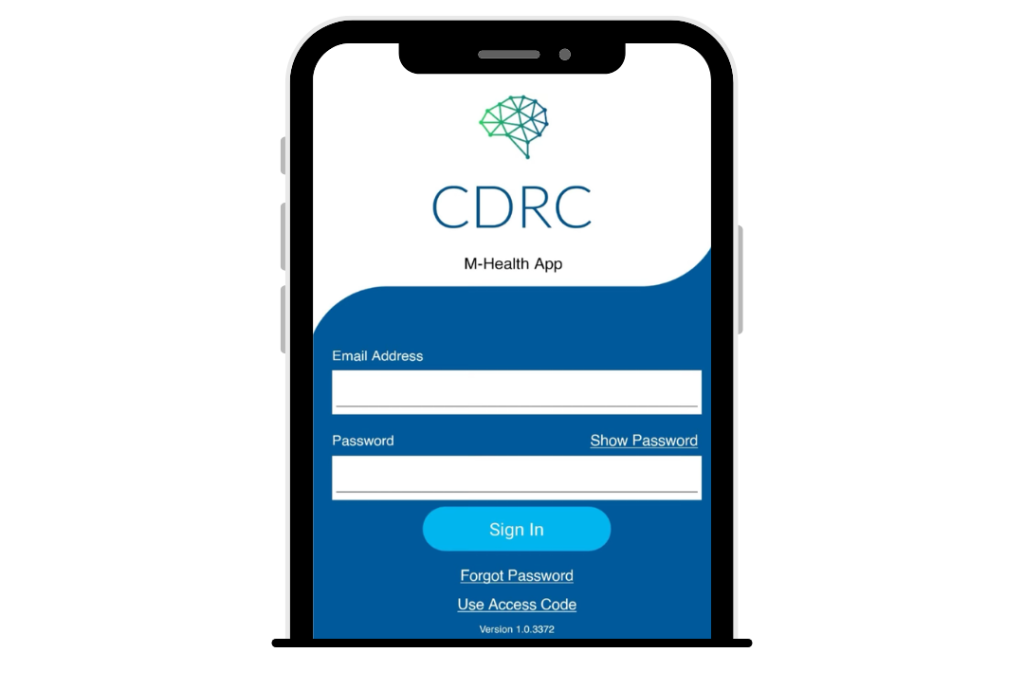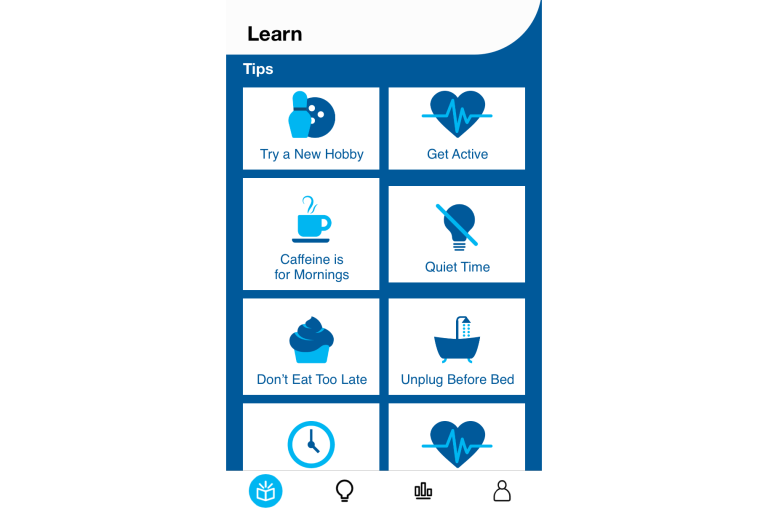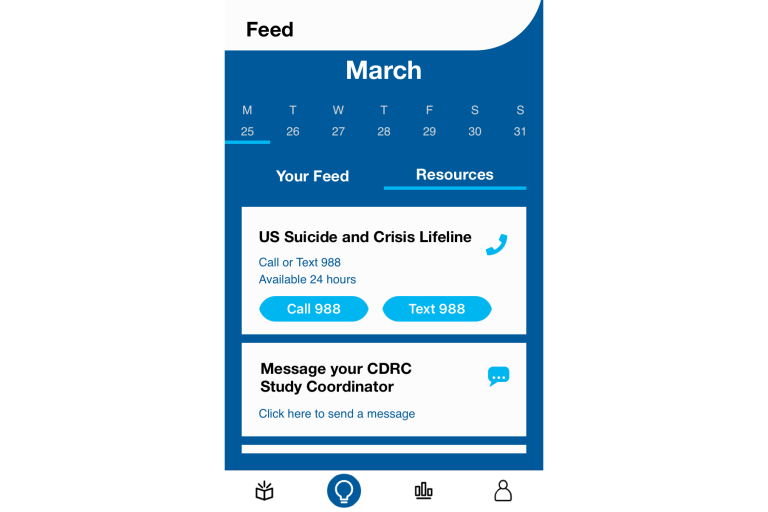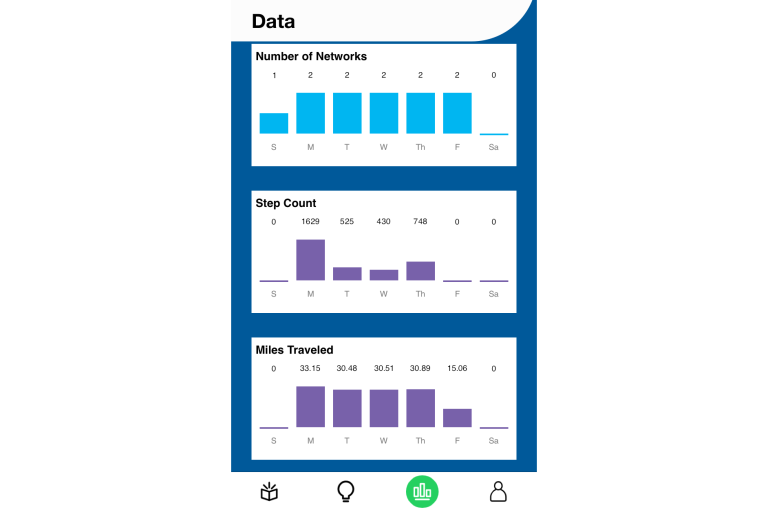
What is mHealth?
CDRC mHealth is an iOS and Android application complemented by a web-based administrative portal. By harnessing comprehensive active and passive data, this app delivers a holistic view of individuals grappling with anxiety and depression. Through this singular platform, clinicians can delve into the behavioral patterns and contextual circumstances of these patients, enabling them to extract correlations and draw significant conclusions, and send appropriate tips or resources to the users.
Our mHealth (“Mobile Health”) app is designed to track your social and physical activity along with your mood changes over time. By using this app and sharing your digital biomarkers, you’re helping us better understand mental health!
This mobile application tests out a set of tools that aim to predict and/or track your level of depression based on how you are interacting with your environment. You will be asked to report about your mood, anxiety, and daily functioning throughout each day. In addition, we will track various aspects of your psychological health, how often you use and interact with your wearable activity monitor/smartphone, and your geolocation data. We will never store your exact location or actively monitor your movements, or view or record any personal or private content in your communications.
Rate your mood twice daily, once in the morning and once in the evening.
Get tips on simple ways to boost your mental and physical wellbeing. Access useful UT Southwestern and Crisis Lifeline resources.
Check out your daily social and physical activity as well as your mood changes throughout the week.
Questions about your participation?
mHealth iOs App Walkthrough
mHealth Android App Walkthrough
Learn (book icon) – here you will find all of your tips. Any new and unread tip will be pinned to the top of the page.

Feed (lightbulb icon) – here you will find your daily surveys and tips under the “Your Feed” column. You will also find under the “Resources” column the US Suicide and Crisis Lifeline phone number, message box for sending an email to your Study Coordinator, and the link to our research site.

Data (bar-chart icon) – here you will be able to see your daily social and physical activity data.

Account (person icon) – here you will find your demographic information, be able to change your password, log out of the app, see what notifications you have enabled, see what data you are sharing, ask to be removed from the study, and send a question to our study team.
Frequently Asked Questions (FAQs)
mHealth is currently only available to individuals enrolled in a research study with the CDRC who have opted-in to participate in the mHealth sub-study. If you are in a CDRC study that includes mHealth as an option and would like to participate, but are not sure if you ever opted-in, please contact your study coordinator to update your consent.
You can navigate through the app using the 4 icons located at the bottom of the app:
- Learn (book icon) – here you will find all of your tips. Any new and unread tip will be pinned to the top of the page.
- Feed (lightbulb icon) – here you will find your daily surveys and tips under the “Your Feed” column. You will also find under the “Resources” column the US Suicide and Crisis Lifeline phone number, message box for sending an email to your Study Coordinator, and the link to the CDRC’s research site.
- Data (bar-chart icon) – here you will be able to see your daily social, phone app use, and physical activity data.
- Account (person icon) – here you will find your demographic information, be able to change your password, log out of the app, see what notifications you have enabled, see what data you are sharing, ask to be removed from the study, and send a question to our study team.
Remember, you can opt out of the app at any point by contacting your study coordinator and updating your study consent.
- Daily Mood Surveys: You will be prompted to take a 1-minute survey to rate your mood twice a day (morning and afternoon)
- Passive Data:
- Steps
- Miles Traveled
- App Screen Time
- Number of calls and texts sent and received
- Number of networks your phone connected to
- Active Energy Heart Rate (if applicable) Walking + Running Distance
- (with more to come!)
- Your lists of contacts
- Who you interact with
- Content of text messages, calls, or emails
- The specific locations you go to
- The content of apps you use
- Your photos and gallery
Note: Any additions to data tracked will either be communicated by email, or require you to update your app permissions to ensure you are aware of changes and agree to continue
- This sub-study requires continuous (daily) use of the app.
- Please ensure your permissions are enabled for passive data tracking and that you are completing the 2 daily mood surveys. If you miss a mood survey, please do your best to complete the next one.
- Compensation: Please refer to your copy of the informed consent for your study.
The mood surveys are currently 4 brief questions and should take about one minute to complete.
- You should be receiving a notification to take your morning survey at 7:00 am CDT and it will be available until 11:00 am CDT
- You should be receiving a notification to take your afternoon/evening survey at 5:00 pm CDT and it will be available until 9:00 pm CDT
If you miss a mood survey, you can take the next one you get a notification for. If you miss 2 mood surveys in a day, please make sure to open the app at least once on that day so your data for the day can sync.
Yes, if you use a wearable that syncs to your phone’s general health app, it will also sync to the mHealth app. If possible, you should also try to keep your wearable on the whole day – even while sleeping!
YES! Your mHealth data is important, but only a piece of the whole picture the research is evaluating. You should keep up with your monthly surveys for your study, and any other main study tasks currently available to you, in order to have data to match up with digital biomarkers for analysis and moving the needle forward on mental health research. Reach out to your study contact if you are not receiving the links for your monthly surveys, or need to schedule your next study visit.
- Having the font size on your phone being set to anything larger than the standard font size setting might be causing the text within the app to get cut off, such as the text of the daily mood surveys.
- You can try resetting your phone font size to the standard size before opening the mHealth app in order to see the full text within the app.
- If you have not activated a native health app on your phone (Apple Health, Google Fit, or Samsung Health), your phone is not collecting the activity metrics needed to sync to the app. If you have never used the primary health app for your phone, you will need to open this up and complete initial setup before it will give the option to sync data.
- Please activate this app and ensure all permissions are enabled for mHealth to access data collected through it, including “Always Allow” access to location.
- You can verify your sensor and usage data collection is turned on by doing the following:
- Go to Settings > Privacy & Security > Research & Usage Data Collection. First ensure the collection toggle is on at the top of the screen. Then under the Apps and Studies using sensor & usage data section, ensure that the UTSW CDRC mHealth app is listed. If it is, clicking on it will take you into the individual settings for each sensor. Device Usage, Message Usage, and Phone Usage should all be toggled on.
- You must enable all permissions the app requests, including allowing location at all times. If you did not see these permissions when you installed the app, you may need to re-install.
- When the app is installed and prompts for location access, please choose “Always Allow” (iOS users may first see this as “Allow While Using App”, then be prompted to switch to “Always Allow” at a later time). If you need more detailed instructions on verifying your permissions, please let us know.
- Additionally, it is important that you open the app at least once per day to give it time to sync your data.
- Please keep the app running in the background, or open it at least once a day. Opening the app to complete the daily mood surveys will help with this. If running in the background, you should see a blue oval around the clock on the left top of your screen indicating it’s running.
Have a question we didn't cover? Email us!
This app was developed by UT Southwestern’s Center for Depression Research and Clinical Care as part of our research initiative to better understand mood disorders.
This app is not a replacement for professional help. If you are in crisis and need immediate assistance, talk to a trusted family member like a parent or friend to help you contact your doctor, mental health care provider or therapist, or another qualified healthcare professional. If you are in immediate danger, please call 911 or go to your nearest emergency room.